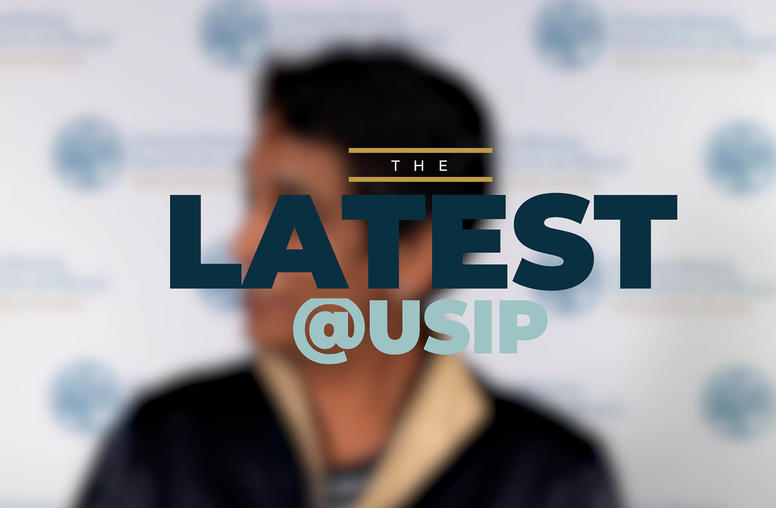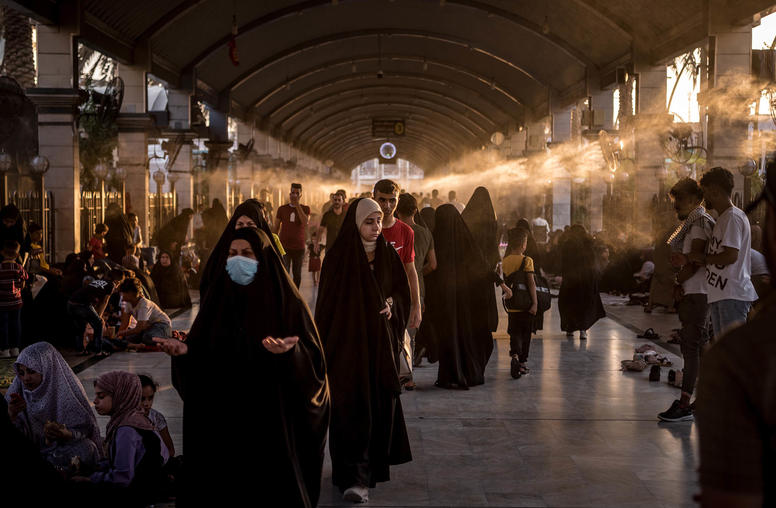How to Put Human Security at the Center of the Response to Coronavirus
Here are eight ways that the security sector can help mitigate the worst effects of the pandemic.
The coronavirus pandemic will have long-lasting repercussions for governance, justice, and security—among many other things. Many governments are working to contain the outbreak by adopting emergency measures and powers. Security sector actors—police, armed forces, border control authorities, penitentiaries, community security groups, and militias—are now playing a key role in limiting the virus’ spread. They have quarantined communities, managed crowds, controlled the flow of people across borders, and enforced social distancing rules. If security sector actors place human security—meaning, the protection of people and communities as opposed to states—at the core of their efforts, they can play a positive role in mitigating the worst consequences the pandemic could have.

The scale of this pandemic is challenging the security sector in unprecedented ways, compounded by the fact that COVID-19 infections are affecting them directly. Many responses have been laudable and have helped ease pressure on health care facilities and reduce fatalities. Others, however, risk perpetuating fragility, exacerbating violence in conflict-affected environments, degrading the rule of law, and strengthening violent extremist groups who aim to take advantage of the heath emergency.
The Security Sector Response: The Good, the Bad and the Ugly
Military and police forces are central to governments’ emergency measures. Countries with political systems as varied as China, Egypt, El Salvador, Iran, Italy, Jordan, France, and Peru, among others, have deployed armed forces domestically. In Italy, the army quarantined entire regions and transported coffins from overloaded cemeteries to new burial sites. In Egypt, soldier have sanitized streets and public squares. The French army transported infected patients and built a field hospital to alleviate overwhelmed hospitals, and the French government has deployed 100,000 police to enforce the quarantine.
Numerous countries’ border agencies have enforced full or partial closures to stop COVID-19 at their borders. Meanwhile, Israel’s internal security agency is using cellphone location data intended for counterterrorism operations to track the movement of people who may have been in contact with carriers of the virus.
Organized criminal groups and paramilitaries are also fighting the virus. Drug gangs in Brazil have imposed strict curfews. The Taliban have launched a public awareness campaign on COVID-19. The Shiite militant group Hezbollah has offered a fleet of ambulances and dispatched health care workers to sanitize public spaces.
Some security actors’ responses, though, have been egregious and violent. Consider that Kenyan police fired tear gas on hundreds of ferry commuters ahead of an overnight curfew and arrested many. Their aggressive response has led to prison overcrowding and intimidated health workers who are trying to assist victims. In South Africa, the military raided a hostel for workers in a township where residents had ignored the lockdown, and citizens have reported police use of rubber bullets on a crowd of shoppers. Three citizens have allegedly been killed and over 1,100 people were arrested. There are reports of police brutality and the use of excessive force in China, Senegal, India, Mauritius, the Philippines, Uganda, and Ivory Coast, among others.
Public health crises do not stop conflicts and some people and states are now forced to contend with both: violent conflicts in Libya, Mali, and Syria, among others, have persisted despite the outbreak.
Security forces’ violent acts are not the only challenge that the COVID-19 response is unleashing. Some response measures are increasing the risk from the pandemic: Guatemala’s police detained over 1,000 people thus far for violating response measures, and Saudi Arabia and Peru are jailing violators of government restrictions for up to five years and three years, respectively. Sequestering this many people together violates social-distancing protocols and is harmful to communities struggling to survive. Meanwhile, Russia and China have detained those criticizing the government’s response to COVID-19.
Elsewhere, military actors have sidelined civilian authorities to strengthen their own position. With Iran’s civilian government struggling to cope with high rates of infection, the Revolutionary Guard has sought to extend its powers and pushed for virus-related restrictions. Pakistan’s security sector leadership has gone around the civilian prime minister to deal directly with provincial authorities. These tactics will exacerbate the pandemic and cause even more lives lost. They will perpetuate conflict, aggravate violent extremism, and increase fragility.
Eight Ways to Prioritize Human Security
Among other measures, security sector leaders and the civilian leadership overseeing them should consider the following:
- Prioritize communities’ and people’s safety and security. Especially during the outbreak of a health emergency, any international, state, or regional security needs are best satisfied when the local health and safety needs of the population are met. Voluntary compliance of a population will be central for the success of quarantine measures, and the greater the trust people have in government and security institutions, the more successful the outcome will be. Security actors need to prioritize responses that enhance people’s trust. Community policing practices are proven to be far more effective. Security forces’ action should be guided by this question: “Does my action make a person feel safe?” Special attention should be paid to women and children’s safety and security given the sharp spike in domestic abuse cases during the pandemic.
- Ensure that security forces refrain from violence and abuse and respect rights. Kenyan police officers’ use of tear gas resulted in people coughing, spitting, and touching their faces—exactly what one is meant to refrain from doing to avoid infection. Additionally, security force abuses risk even further dangerous outcomes, as such abuses have been documented as a primary tipping point for people who joined a violent extremist group. To contain the virus and not risk exacerbating societal conflict, security actors need to adopt measured, nonviolent approaches that respect individuals’ rights.
- Heed the U.N. secretary-general’s call for a global cease-fire. Philippine President Rodrigo Duterte declared a unilateral cease-fire with domestic communist guerillas to focus attention on the pandemic and the guerillas have agreed to heed the U.N.’s call. Saudi Arabia and the UAE have also declared a unilateral cease-fire in Yemen. However, many conflicts persist without a recognition of the common enemy. In Libya, a Tripoli hospital treating coronavirus patients was bombed. Leaders of all security forces must focus their attention on stemming the spread of the virus, not making it worse. Otherwise they risk their legitimacy, possibly infection among their troops and the regions and territories they control.
- Reduce prison populations. Prisons are perfect environments for the spread of COVID-19. This is not the time for security forces to add to prisons’ burden with mass detentions. Prison officials should also strive to find ways to reduce prison populations: those who are in pre-trial detention or whose terms will expire within a year could be released early, as can nonviolent offenders. Turkey will free 45,000 prisoners temporarily and another 45,000 permanently, and Iran has temporarily freed 85,000 prisoners to avoid the spread of the virus. All affected countries should take such measures. Police forces must also consider postponing non-essential arrests, and not arresting people for disobeying the quarantine, but rather seek alternatives such as fines or other rehabilitation measures.
- Clarify roles and ensure accountability of security sector actors. As security sector actors are called upon to undertake functions that may not be within their traditional mandate, it is imperative that legislative bodies clarify the temporary role that security actors are tasked with and indicate when that role will expire or when it will be reviewed. This could be done through the adoption of laws or by-laws. If they are not already in place, legislation and regulatory frameworks for parliamentary oversight bodies or mechanisms are needed to ensure security sector actors’ accountability during the health emergency.
- Establish civilian and military coordination centers. USIP President Nancy Lindborg has highlighted that a key lesson of the Ebola epidemic of 2014-2015 is that “trust is paramount … when you do not have citizen trust in their government, it becomes much more difficult to get the kind of actions and behaviors that are absolutely essential for defeating these kinds of diseases and pandemics.” Good collaboration between civil and military actors is critical to help build trust during a health crisis. In Guinea, civilian and military coordination centers worked closely and shared information in joint daily briefings. Liberia had county-level Ebola task forces that coordinated between county health teams, county leaders, civil society groups, as well as community and business representatives. Coordination and transparency are basic tenets of crisis response, while misinformation and secrecy can be fatal.
- Cooperate with non-state armed actors and community security groups. Cooperation between state-actors and such groups is essential to controlling the spread of the virus, and the crisis presents an opportunity for productive engagement. All efforts undertaken by state authorities in cities and regions they control will be undermined unless they cooperate and coordinate with groups that control other territories. Coordination need not touch on issues other than the optimal ways to confront the common enemy of COVID-19.
- Enforce stringent anti-corruption rules. One corrupt actor in the response chain can destroy all the progress made by all the others. The Ebola response showed that corrupt individuals taking bribes can compromise security and the health of many. Strict anti-corruption measures must be adopted and enforced now to prevent the fallout of bad actors later.
The coronavirus pandemic is posing the greatest challenge for humanity in the 21st century. It has also created opportunities for cease-fires between combatants, for peace between enemies, for cooperation across and within borders, and for building trust where there may be none. A security sector approach that focuses on human security offers the best chance at seizing those opportunities for the good of us all.
Calin Trenkov-Wermuth is a security governance advisor at the U.S. Institute of Peace.



